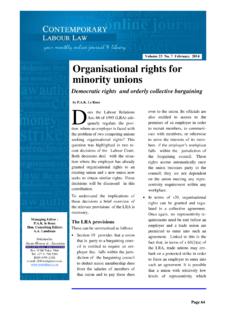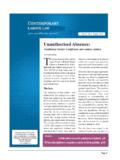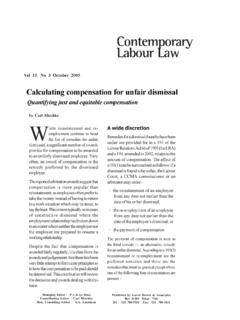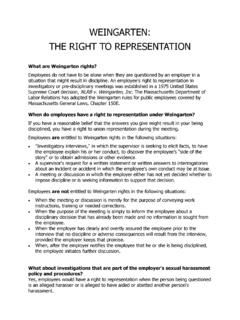Transcription of Volume 26 No. 5 December 2016 Insolence and …
1 Page 45 T wo recent decisions of the Labour Appeal Court (LAC) have dealt with the fairness of dismissals on the grounds of in-subordination. Both of these deci-sions are of interest and will be dis-cussed in this contribution. Sylvania Metals (Pty) Ltd v Mello & others I n Sylvania Metals (Pty) Ltd v Mello & others (JA83/2015) 22/11/2016) the dismissed employ-ee, a Mr Mosehle, had been em-ployed as a mechanical fitter. In this capacity he repaired a high pressure valve in the employer s plant without obtaining the necessary permit. He did so in the presence of his supervi-sor. The plant manager then called a meeting of all the relevant team s members to discuss this incident be-cause repairing the valve without a permit being issued by the plant manager constituted a contravention of a safety rule.
2 Precisely what was said and what occurred during the course of the meeting was the subject of dispute at the subsequent CCMA proceedings but what is not in dis-pute is that Mosehle walked out of the meeting. He was subjected to a disciplinary hearing in which he faced two charges. The first was de-scribed as a serious breach of compa-ny safety rules in that he had repaired the valve without obtaining the nec-essary permit. The second was that he had been grossly insubordinate and insolent during the course of the meeting. Mosehle was found guilty of these offences and he referred an unfair dismissal dispute to the CCMA. The commissioner found that dismissal for repairing the valve without ob-taining the permit was unfair. The employer had not produced a policy Insolence and insubordination Managing Editor: le Roux Hon.
3 Consulting Editor: Landman Published by Box 31380 Tokai 7966 Tel: +27 21 788 5560 ISSN-1995-218X e-mail: Volume 26 No. 5 December 2016 by le Roux The Courts views on employees gone rogue Employment contracts and medical examinations p50 Failure to disclose criminal offences to employer p54 Page 46 reflecting this rule. In addition, the fact that the supervisor had been present when the re-pairs had been carried out, and had not stopped Mosehle from doing so, indicated that he (the supervisor) saw nothing wrong with Mosehle s conduct. The commissioner also found that Mosehle had not been guilty of insubordination when he walked out of the meeting. No specific instruction had been issued to him that he failed to comply with. However, his conduct did constitute inso-lence. But because the conduct did not con-stitute gross Insolence , dismissal was not merited.
4 The fact that Mosehle was still sub-ject to a valid final written warning for in-subordination was irrelevant because inso-lence and insubordination were distinct of-fences. Mosehle was reinstated with retro-spective effect. On review, the Labour Court found that the commissioner s findings that Mosehle had not been grossly insubordinate and that there had been no breach of a safety rule, was not unreasonable and could not be overturned. The reinstatement order was also reasonable. The review application was dismissed. On appeal to the LAC the Court took a dif-ferent approach. It argued as follows South Africa courts have traditionally viewed respect and obedience as the im-plied duties of an employee. This refers to the duty to adhere to the lawful and reasonable instructions of the employer.
5 A repudiation of these duties by the em-ployee constitutes a fundamental and calculated breach of the employer s law-ful authority - [16] ..given that an appropriate de-gree of mutual trust, respect and courtesy is to be shown by both employer and em-ployee towards the other in the context of an employment relationship. Insubordination occurs when an employ-ee refuses to accept the authority of a person in a position of authority over him or her. It includes a wilful and serious re-fusal by an employee to comply with a reasonable instruction issue by the supe-rior. But it extends further it includes conduct which poses a serious and delib-erate challenge to the employer s authori-ty even where no instruction has been given. In support for this proposition the LAC referred to its earlier decision in Palluci Home Depot (Pty) Ltd v Her-skowitz & others (2015) 36 ILJ 1511 (LAC), where the Court pointed out that there is a fine line between insubordina-tion and Insolence .
6 Insolence is conduct that is offensive, disrespectful in speech or behaviour, impudent, cheeky, rude, in-sulting or contemptuous, but that inso-lence may become insubordination where there is an outright challenge to the em-ployer s authority. Nevertheless acts of Insolence and insubordination do not jus-tify dismissal unless they are serious and wilful. The sanction of dismissal is re-served for instances of gross Insolence and gross insubordination or the wilful flouting of the instructions of the em-ployer. The evidence before the commissioner showed that, during the meeting, Mosehle had indicated that he was un-willing to work with the plant manager. He had been argumentative and hostile towards the plant manager and had shown that he would not work according to the standards laid down by the plant manager.
7 He left the meeting before it had been concluded. His behaviour went well beyond a reasonable or legitimate difference of opinion between employer and employee. He had been aggressive, rude and disrespectful towards the plant Contemporary Labour Law Vol. 26 No. 5 December 2016 Page 47 manager. His refusal to explain the cir-cumstances in which he had repaired the valve constituted a serious and wilful re-fusal to adhere to a reasonable and lawful instruction. He had been not merely inso-lent but also insubordinate. The commis-sioner s finding that the Mosehle s con-duct was not sufficiently serious to consti-tute gross Insolence or gross insubordina-tion was unreasonable and unsustainable. As far as sanction was concerned, the LAC referred to the approach adopted by the Constitutional Court in Sidumo v Rusten-burg Platinum Mines Ltd & others (2007) 28 ILJ 2405 (CC), namely that a commis-sioner considering an unfair dismissal dis-pute does not have the power to consider afresh what he or she should do; the com-missioner must decide whether the em-ployer s decision to dismiss was fair after considering all the relevant circumstances.
8 In this case the relevant circumstances in-cluded the nature of the misconduct, the fact that Mosehle still had a final written warning against his name, that he was the sole breadwinner with five dependents, that he was 42 years old, that his superior had indicated in his evidence that he was not prepared to work with him in the fu-ture, his limited service with the employer and his lack of remorse. Mosehle s con-duct had had a serious impact on the em-ployment relationship and posed an ap-preciable operational risk to the employ-er. The LAC came to the conclusion that, in the circumstances of this case the sanction of dis-missal was fair. [29] I am satisfied in the circumstances of this matter that the sanction of dismissal was fair. There is no merit in the conten-tion that the employee s conduct did not display disrespect of Mr Malema when the facts clearly show otherwise, even in spite of Mr Malema not being the employee s immediate supervisor but the plant manag-er.
9 The employee refused to accept or re-spect the authority of his superior and at-tempted to direct the manner in which he would accept future work instructions. He displayed a lack of remorse for his behav-iour, which he had failed to correct even while on a final written warning. Having regard to all of these relevant circumstanc-es, and in spite of mitigating personal con-siderations, I am satisfied that a continued working relationship was intolerable and that the dismissal of the employee was fair. The Labour Court erred, in my mind, in finding differently. The arbitrator s award was set aside and re-placed with a finding that Mosehle s dismissal was fair. Msunduzi Municipality v Hoskins T he decision in Msunduzi Municipality v Hoskins (DA 14/15 2/9/2016) dealt with a claim by a Mr Hoskins that he had been un-fairly dismissed.
10 He had been employed as a human resources support services manager. Part of his duties was to advise other manag-ers employed by his employer, the Msunduzi Municipality, on employment related matters, including disciplinary matters. He was a mem-ber of the management team. Whilst making his way up the ranks in the Municipality Hoskins had been a member of various trade unions. In this capacity he had advised and represented co-employees at dis-ciplinary enquiries. When he became a mem-ber of the management team he ceased to be a member of a union but continued to represent co-employees at disciplinary enquiries. This became a source of concern for other members Contemporary Labour Law Vol. 26 No. 5 December 2016 Page 48 of management; they saw this as creating a conflict of interest.
















